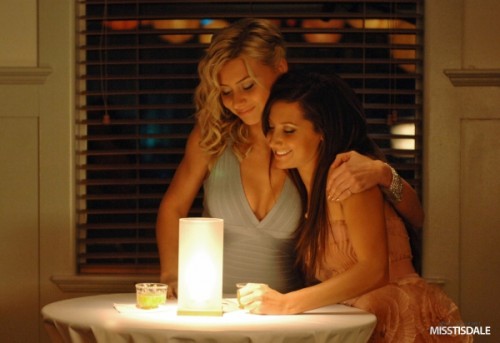Bicurious cheerleaders: vanguard of neoliberalism
 Hellcats is no Gossip Girl, but it’s quite an entertaining show; its also a troubling one, in a way which I think may be revealing. The show is basically a TV version of Bring it On, portraying the world of competitive college cheerleading, but the main attraction is the adorably subtext-y relationship between the two main characters, Marti, a law student who would probably be described as “feisty,” and Savannah, head cheerleader and lapsed (or lapsing) Christian fundamentalist. This may have reached its high point in the recent episode in which the two settle a disagreement with a pillow fight, the classic nudge-wink signifier of lesbian eroticism (though unusually played here as sweet, rather than titillating).
Hellcats is no Gossip Girl, but it’s quite an entertaining show; its also a troubling one, in a way which I think may be revealing. The show is basically a TV version of Bring it On, portraying the world of competitive college cheerleading, but the main attraction is the adorably subtext-y relationship between the two main characters, Marti, a law student who would probably be described as “feisty,” and Savannah, head cheerleader and lapsed (or lapsing) Christian fundamentalist. This may have reached its high point in the recent episode in which the two settle a disagreement with a pillow fight, the classic nudge-wink signifier of lesbian eroticism (though unusually played here as sweet, rather than titillating).
What’s not so good about the show is the weirdly excessive individualism. Of course, most TV shows are implicitly individualist, assuming that every problem can be solved by an individual with sufficient gumption. What’s odd about Hellcats is that it repeatedly goes out of its way to mention collective action in order to dismiss it. The starting point of the show is that law student Marti loses the scholarship she had been receiving because her mother works for the university. Marti’s mother suggests they take this up with the union representing campus workers, of which she is a member, but Marti knows that the real solution is for her to take part in a competition to win a place on the cheerleading team, and the scholarship that goes with it. Later on, Marti’s law professor asks her to work for him on a case he intends to use to demonstrate the unconstitutionality of three-strikes laws. Marti gives an impassioned defense of the principle that, rather than caring about the thousands of people who are imprisoned under three-strikes laws, they should focus on proving the innocence of the particular individual involved in this test case; the professor’s moral sense is re-awakened, and he agrees to abandon his campaign against three-strikes laws.
I have to thank the show, though, for combining implied homosexuality and rampant individualism in a way which actually makes something clear about contemporary constraints on media representation of women’s sexuality, encapsulated by the figure of the bicurious cheerleader. What seems to allow this combination of homosexuality and American wholesomeness is that female characters are allowed to have some same-sex sex, on condition they don’t convert this into a substantive same-sex identification. One fairly harmless example of this is the (I assume intentional, aimed at the fanfic demographic) subtext of Hellcats; harmless because it is possible to read Marti and Savannah as genuinely lesbian-identified women who just by chance never explicitly mention this on screen. A more annoying example is the dramatically different level of seriousness accorded to male and female homosexuality in 90210. Last season saw Adrianna in a classic “gay-for-sweeps” subplot in which she left her boyfriend for a girl for two episodes, after which she reunited with her boyfriend and the story was never mentioned again. This season, on the other hand, Teddy’s realization that he is gay is taking up numerous episodes of angst and a coming-out scene that portrays his homosexuality as very serious and irreversible (this, incidentally, seems to now be the media-approved form of male homosexuality, in which you can be gay as long as you’re stoically heroic about it; see also the campaign to repeal Don’t Ask, Don’t Tell).
What these representations of female same-sex sexuality do, it seems to me, is erase the idea of sexuality as an identification that could lead to commonality and solidarity. There’s something in common here erasure of sexual identity that occurs in two denials of the existence of bisexuality (both of which, I regret to say, I have at one point subscribed to): there’s the biphobic claim that no-one is really bisexual, and those who claim to be are either homosexuals in denial or straights trying to grab some queer cachet; or there’s the mirror image hippyish claim that, like, everyone is naturally bisexual, yeah. What both miss is the Foucauldian point that sexuality is not a transparent or natural property of individuals, but something that is rendered possible by a particular social context.
Foucault in The History of Sexuality emphasizes the biopolitical utility of sexual identity, in which people are encouraged to identify with the categorizations that regulate them, but 40-odd years of LGBT activism show that this kind of biopolitical identification can be the basis of resistance as well as regulation. When seen in this context, and in the context of Hellcats‘ hyper-individualism, I wonder if this apparent trend towards fairly positive depictions of gay and bisexual women, on condition that these characters don’t actually identify as gay or bisexual (the state of limbo appropriately designated by the stupid term “bicurious”), is an attempt to push the Foucauldian logic of identification-as-segregation to an extreme that would preclude its political redeployment, by assigning every individual a (supposedly) unique and personalized sexuality.